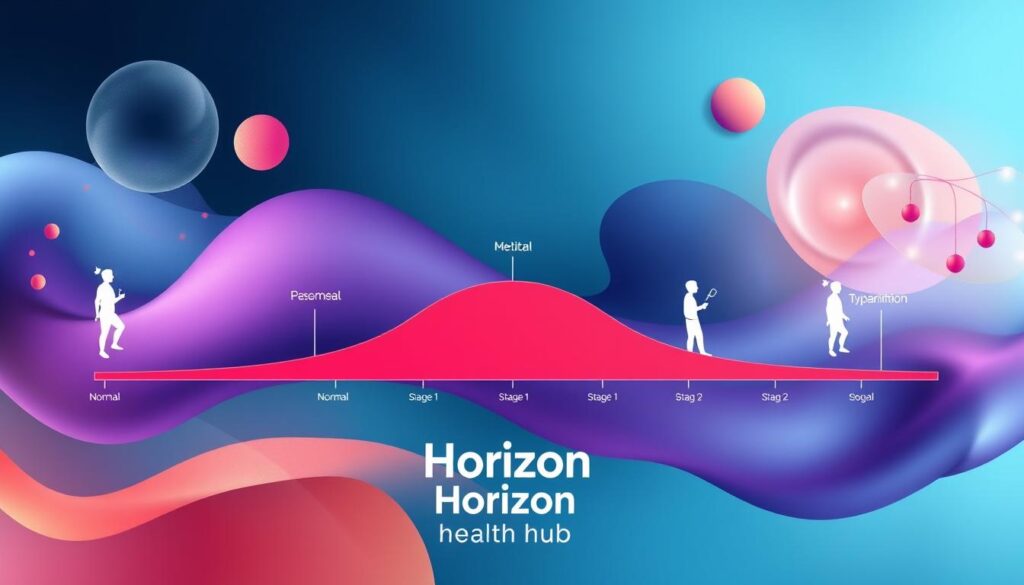
Blood pressure is a key health measure that affects our overall well-being. This article will explain what blood pressure is, why it’s important, and what affects it. If you’re worried about your blood pressure or just want to learn, this guide is for you. It’s packed with info to help you manage your heart health.
Key Takeaways
- Blood pressure is the force of blood against artery walls as the heart pumps it.
- Keeping blood pressure healthy is key to avoiding heart disease and stroke.
- Lifestyle choices like diet, exercise, and stress levels can change blood pressure.
- Monitoring and managing blood pressure can help control health risks.
- Knowing about blood pressure categories and risks is vital for heart health.
What is Blood Pressure?
Blood pressure shows the force blood pushes against artery walls as the heart pumps it. It’s a key sign of heart health and overall well-being.
The Basics of Blood Pressure
Blood pressure is shown as two numbers: systolic and diastolic. Systolic is the higher number, showing blood pressure when the heart contracts. Diastolic is the lower number, showing pressure when the heart rests.
A healthy blood pressure is around 120/80 mmHg. But, normal ranges can change based on age, gender, and health.
Why Blood Pressure Matters
Keeping blood pressure healthy is key for the heart and cardiovascular system. High blood pressure, or hypertension, can cause serious problems. These include:
- Increased risk of heart disease and stroke
- Damage to blood vessels and vital organs, such as the kidneys and brain
- Heightened likelihood of developing other conditions like heart failure and kidney disease
Understanding blood pressure and managing it can improve health. It can also lower the risk of serious complications.
Factors Affecting Blood Pressure
Knowing what affects blood pressure is key to a healthy heart. Many things, from what we eat to our lifestyle, play a part. These elements help decide our blood pressure levels.
Our diet is a big player in blood pressure. Eating too much salt, fat, and processed foods can raise it. But, eating more fruits, veggies, whole grains, and lean meats can lower it.
Exercise and physical activity also matter a lot. Activities like walking, cycling, or swimming can make your heart stronger. This can help lower your blood pressure over time.
Stress is another big factor. It can make your body release hormones that increase blood pressure. Doing things like meditation, yoga, or deep breathing can help reduce stress and its effect on blood pressure.
Also, certain health issues like kidney disease, thyroid problems, or sleep apnea can raise blood pressure. Regular doctor visits can spot and treat these problems.
By tackling these lifestyle and health factors, we can manage our blood pressure. This can help prevent serious health problems.
https://www.youtube.com/watch?v=m6dIFtc4EcY
Measuring Blood Pressure
It’s key to track your blood pressure to keep your heart healthy. You can do this at home or by visiting a healthcare provider.
At-Home Blood Pressure Monitoring
Monitoring your blood pressure at home can give you insights into your health. A good home blood pressure monitor lets you check your levels often. This way, you can notice any changes quickly.
Make sure to follow the instructions for your device. This ensures you get accurate readings.
- Choose an upper-arm cuff monitor for the most precise measurements.
- Take readings at the same time each day, ideally in the morning and evening.
- Sit quietly for 5 minutes before taking a reading, and support your arm at heart level.
Professional Blood Pressure Readings
While home monitoring is handy, seeing your doctor for blood pressure checks is also crucial. Doctors and nurses use special tools and methods to get the most accurate readings.
| Measurement | At-Home | Professional |
|---|---|---|
| Cuff Type | Upper-arm | Upper-arm or Wrist |
| Positioning | Seated, Arm Supported | Seated, Bare Arm, Supported |
| Frequency | Daily or Weekly | Every 1-2 Years |
Knowing how to measure blood pressure at home and at the doctor’s office is important. It helps you manage your heart health well.
Blood Pressure Categories
Knowing your blood pressure is key to staying healthy. It’s divided into categories based on systolic and diastolic readings. Knowing your blood pressure helps you and your doctor plan the best care.
Normal Blood Pressure Range
The normal range is less than 120 mm Hg for systolic and less than 80 mm Hg for diastolic. This range lowers the risk of heart disease and other health issues.
Elevated and High Blood Pressure
Elevated blood pressure is 120-129 mm Hg systolic and less than 80 mm Hg diastolic. High blood pressure, or hypertension, is 130 mm Hg or higher systolic or 80 mm Hg or higher diastolic. High blood pressure raises the risk of heart disease, stroke, and other serious health problems if not treated.
| Blood Pressure Category | Systolic (mm Hg) | Diastolic (mm Hg) |
|---|---|---|
| Normal | Less than 120 | Less than 80 |
| Elevated | 120-129 | Less than 80 |
| Hypertension (High Blood Pressure) | 130 or higher | 80 or higher |
Checking your blood pressure regularly is important. It helps you and your doctor keep your heart healthy.

Blood Pressure and Health Risks
High blood pressure is a serious health issue. It can lead to serious conditions like heart disease, stroke, and kidney disease. It’s important to understand how blood pressure affects your health to stay well.
High blood pressure harms the heart and blood vessels. It can cause plaque to build up in arteries. This makes the heart work harder and increases the risk of heart disease and stroke.
| Condition | Risk with High Blood Pressure |
|---|---|
| Heart Disease | 2-3 times higher |
| Stroke | 4 times higher |
| Kidney Disease | 2 times higher |
| Vision Loss | 2-3 times higher |
High blood pressure can also harm the kidneys. It can lead to kidney disease and even failure. It can cause vision problems, like vision loss or blindness, by damaging eye blood vessels.
“Uncontrolled high blood pressure is a leading risk factor for heart disease and stroke, two of the leading causes of death in the United States.”
But, you can manage your blood pressure to lower these risks. Regular checks, lifestyle changes, and medication can help. They are key to keeping your blood pressure healthy and protecting your heart.
Lifestyle Changes for Better Blood Pressure Control
Keeping your blood pressure healthy is key to feeling good. Making smart lifestyle changes can help manage this important health marker. By changing what you eat and staying active, you can support your blood pressure and lower health risks.
Dietary Modifications
One key diet change for blood pressure is to eat less sodium. Too much sodium can raise blood pressure. So, cut down on processed foods, canned goods, and salty snacks. Instead, eat more fresh fruits, veggies, whole grains, and lean proteins. These foods help keep your blood pressure healthy.
Exercise and Physical Activity

Exercise and staying active are also vital for a healthy blood pressure. Activities like brisk walking, swimming, or cycling can lower blood pressure. They improve heart health and reduce stress. Try to do at least 30 minutes of moderate exercise every day to help your blood pressure.
- Try different exercises to stay interested and challenge yourself.
- Talk to a healthcare expert to create a exercise plan that fits your blood pressure needs and health.
- Slowly increase the time and intensity of your physical activity to build up and see better blood pressure results.
By choosing smart lifestyle options, you can play a big role in managing your blood pressure. This helps keep your heart healthy too.
Blood Pressure Medications
Changing your lifestyle can help manage high blood pressure. But sometimes, you need medication to control it better. These drugs help lower the blood pressure by making it easier for the heart to pump blood.
There are many types of blood pressure medications. Each works in a different way to lower blood pressure. Here are some common ones:
- Diuretics – Help the kidneys remove extra sodium and water. This reduces the blood volume the heart has to pump.
- ACE Inhibitors – Block a hormone that narrows blood vessels. This lets them relax and improve blood flow.
- Angiotensin II Receptor Blockers (ARBs) – Stop a hormone that narrows blood vessels. This lowers blood pressure.
- Calcium Channel Blockers – Make blood vessels relax and widen. This reduces the heart’s pumping force.
- Beta-Blockers – Slow the heart rate and reduce its force. This lowers the heart’s workload.
Working with your healthcare provider is key to finding the right medication. Managing your blood pressure medication is important. It helps prevent serious problems related to high blood pressure.
| Medication Class | How They Work | Common Examples |
|---|---|---|
| Diuretics | Reduce fluid volume in the body | Hydrochlorothiazide, Furosemide |
| ACE Inhibitors | Block the production of a hormone that constricts blood vessels | Lisinopril, Enalapril |
| Angiotensin II Receptor Blockers (ARBs) | Prevent the action of a hormone that causes blood vessels to narrow | Losartan, Valsartan |
| Calcium Channel Blockers | Relax and widen blood vessels | Amlodipine, Nifedipine |
| Beta-Blockers | Reduce the heart’s workload | Metoprolol, Carvedilol |
Talking to a healthcare provider is crucial for finding the right blood pressure medication. They consider your needs and any other health conditions. They create a plan to manage your blood pressure effectively.
Managing Stress for Healthy Blood Pressure
High stress can really hurt your blood pressure, making hypertension worse. It’s key to manage stress to keep your blood pressure healthy. By using stress-reducing techniques every day, you help your mind and body stay well.
Relaxation practices are a big help in managing stress and blood pressure. Deep breathing, meditation, and mindfulness can lower stress signs, which helps your blood pressure. These practices help you feel calmer and more in control, making it easier to handle life’s challenges.
Changing your lifestyle is also important for stress and blood pressure. Exercise, eating well, and getting enough sleep all help manage stress and keep your heart healthy. Taking care of your whole self helps you handle stress better and keeps your blood pressure in check.
| Stress Management Strategies | Benefits for Blood Pressure |
|---|---|
| Relaxation Techniques (e.g., deep breathing, meditation, yoga) | Reduces physiological markers of stress, leading to lower blood pressure |
| Regular Physical Activity | Improves cardiovascular fitness and helps manage stress |
| Balanced Nutrition | Provides essential nutrients to support overall health and stress resilience |
| Quality Sleep | Allows the body to rest and recover, contributing to better stress management |
Using a mix of stress-reducing strategies daily can help your blood pressure, mental health, and overall well-being. Remember, managing stress is a journey. Finding what works for you can greatly improve your heart health over time.
“The greatest weapon against stress is our ability to choose one thought over another.” – William James
Blood Pressure and Age
As we get older, our blood pressure usually goes up. It’s important to keep an eye on it to stay healthy. Knowing how age affects blood pressure helps us take care of our hearts.
Blood pressure goes up with age because of changes in our bodies. Our blood vessels get less flexible, making it harder for the heart to pump blood. Lifestyle changes like less exercise, gaining weight, and eating differently also play a part.
| Age Range | Average Blood Pressure |
|---|---|
| 20-29 years | 115/75 mmHg |
| 30-39 years | 120/80 mmHg |
| 40-49 years | 125/85 mmHg |
| 50-59 years | 135/90 mmHg |
| 60-69 years | 145/95 mmHg |
| 70+ years | 150/100 mmHg |
But, there’s a silver lining. With the right steps, we can keep our blood pressure healthy as we age. Exercise, a healthy diet, managing stress, and sometimes medicine can help.
By understanding the connection between age and blood pressure, we can protect our heart health. This way, we can stay active and enjoy life well into our senior years.
“Monitoring and managing blood pressure is crucial for maintaining overall health as we age.”
Conclusion
Keeping your blood pressure healthy is key for your heart’s wellbeing. Knowing how blood pressure works and what affects it helps a lot. By making smart choices, you can keep your blood pressure in check.
It’s important to check your blood pressure regularly. This can be at home or with your doctor. Eating right and staying active are big helps. Also, managing stress and getting medical help when needed is crucial.
Learning about blood pressure and taking action is the first step to a healthier heart. Use the tips from this article to improve your blood pressure, health, and management. Start your journey today for a better life.





